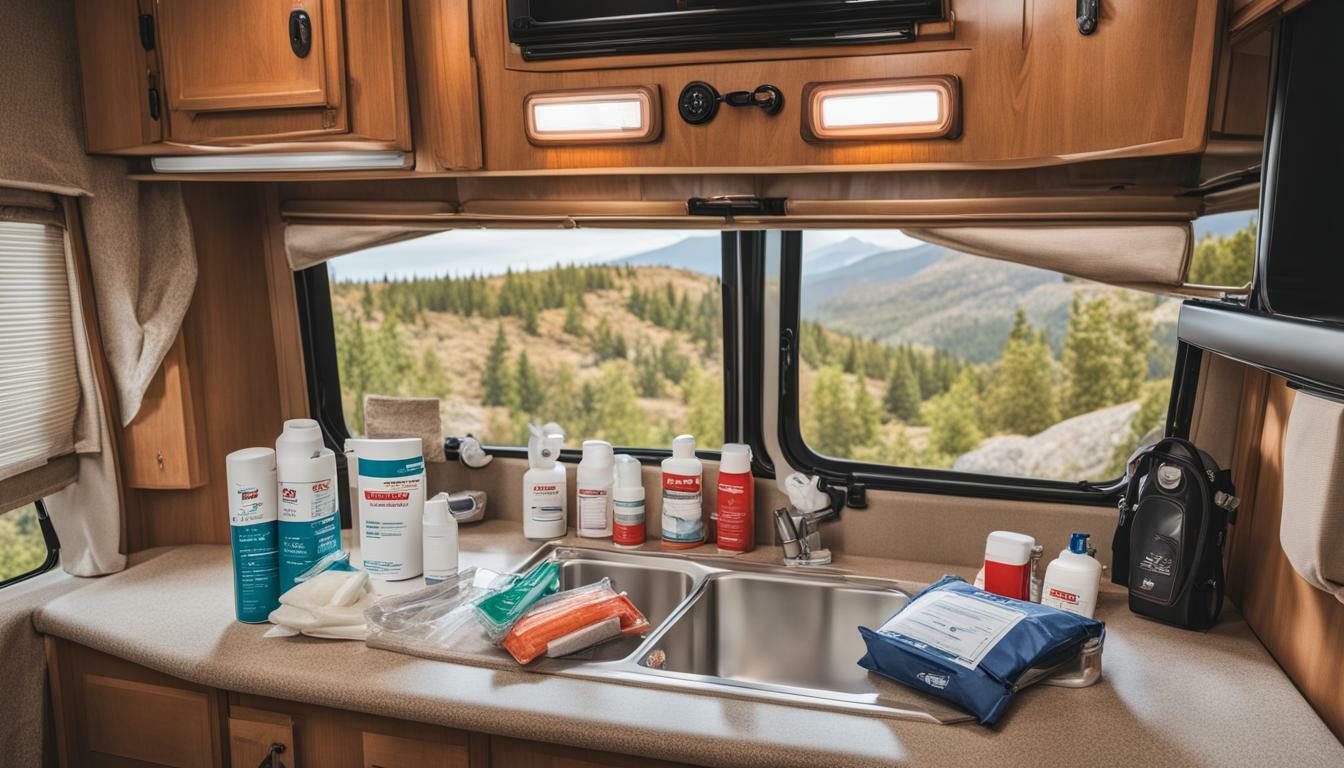As full-time RVers, exploring new places and enjoying the freedom of the open road is an exciting adventure. However, it’s important to remember that accidents and injuries can happen at any time, and it’s essential to be prepared to handle them. That’s where first aid kits come in. By having a well-stocked first aid kit on hand, you can ensure that you’re ready to handle any minor injuries or illnesses that may arise during your travels. In this section, we’ll take a look at the importance of having first aid kits for full-time RVers and how they contribute to nomadic health preparedness.
It’s important to remember that when you’re traveling full-time, access to medical facilities may not always be immediately available. That’s why it’s crucial to have a first aid kit on hand that contains all the necessary supplies to handle any minor injuries or illnesses that may arise. By taking the time to prepare a well-equipped first aid kit, you can ensure that you’re ready to handle any situation and keep yourself and your loved ones safe.
Additionally, having a first aid kit on hand can contribute to overall nomadic health preparedness by offering peace of mind. Knowing that you have the necessary supplies to handle any minor injuries or illnesses can alleviate stress and allow you to focus on enjoying your travels.
Overall, first aid kits are an essential component of nomadic health preparedness for full-time RVers. In the next section, we’ll take a closer look at the necessary contents of a well-equipped first aid kit for full-time RVers and how it can help ensure your safety on the road.
Stay Safe on the Road with Well-Equipped RV First Aid Kits
As a full-time RVer, it’s crucial to be well-prepared for any incidents that may arise on the road. One of the most important steps towards ensuring your safety is by having a well-equipped first aid kit on board.
First aid kits for full-time RVers should contain essential medical supplies to treat common injuries and illnesses, as well as any prescription medications and a list of emergency contacts. Typical contents of RV first aid kits may include:
| Item | Description |
|---|---|
| Bandages and dressings | Various sizes for cuts, scrapes, and burns |
| Antiseptic wipes and ointment | To clean and disinfect wounds |
| Tweezers and scissors | To remove splinters and cut bandages |
| Thermometer | To monitor fever or other symptoms |
| Pain relievers | For headaches, muscle pains, and fever |
| Prescription medications | Any medications you require regularly |
| Emergency contact list | Names and phone numbers of family, friends, and medical professionals |
It’s also important to regularly check and restock your first aid kit, ensuring that all items are up-to-date and in good condition.
Having a comprehensive first aid kit on board can help you feel more confident and secure on the road, knowing that you are prepared for any health-related incidents that may occur.
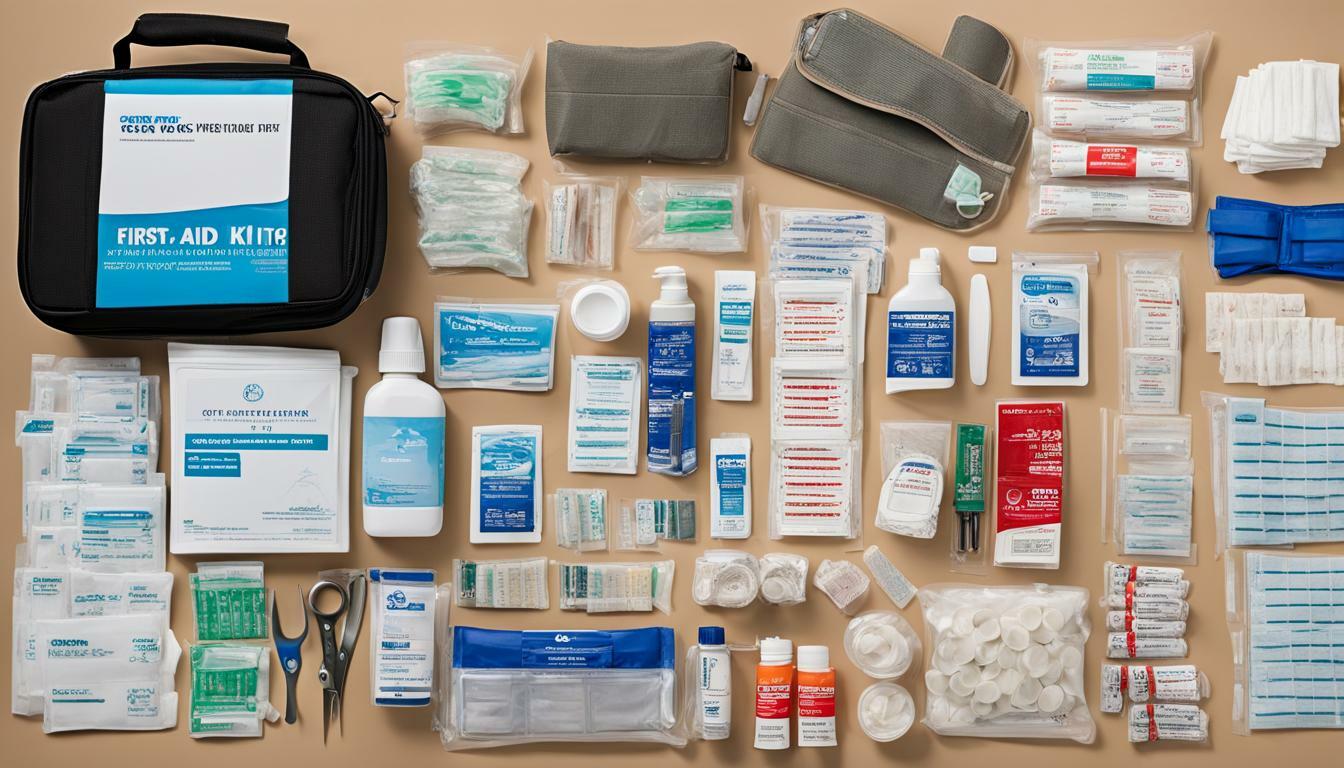
Prioritize Health Preparedness for Full-Time RVers
Full-time RVers are constantly on the move, making it imperative to prioritize health preparedness. When traveling to new and unfamiliar territories, access to medical facilities may be limited, and carrying the necessary medical supplies can make all the difference in ensuring optimal well-being on the road.
When it comes to health preparedness for full-time RVers, having a well-stocked first aid kit is crucial. It’s essential to keep the kit easily accessible and regularly check for expired medications and supplies. Items such as band-aids, antiseptics, gauze, pain relievers, and any necessary prescription medicines should be included.
In addition to the basic first aid kit, there are specific items that full-time RVers should consider including in their health preparedness kit. These items include:
| Item | Purpose |
|---|---|
| Hand sanitizer | To prevent the spread of germs and bacteria |
| Sunscreen | To protect skin from harmful UV rays |
| Insect repellent | To prevent bug bites and the spread of insect-borne diseases |
| Tweezers | To remove splinters or ticks |
| Disposable gloves | To protect against possible contamination when administering first aid |
By including these items in their health preparedness kit, full-time RVers can help prevent illness and injury while on the road.
Furthermore, it’s essential to have a clear understanding of the local emergency services and medical facilities in the areas where you’ll be traveling. In case of an emergency, having this knowledge can help save vital time and potentially even lives.
Overall, prioritizing health preparedness for full-time RVers is crucial for maintaining optimal well-being on the road. By having a well-stocked first aid kit and including specific items for optimal health preparedness, full-time RVers can stay safe and healthy while experiencing the joys of life on the road.
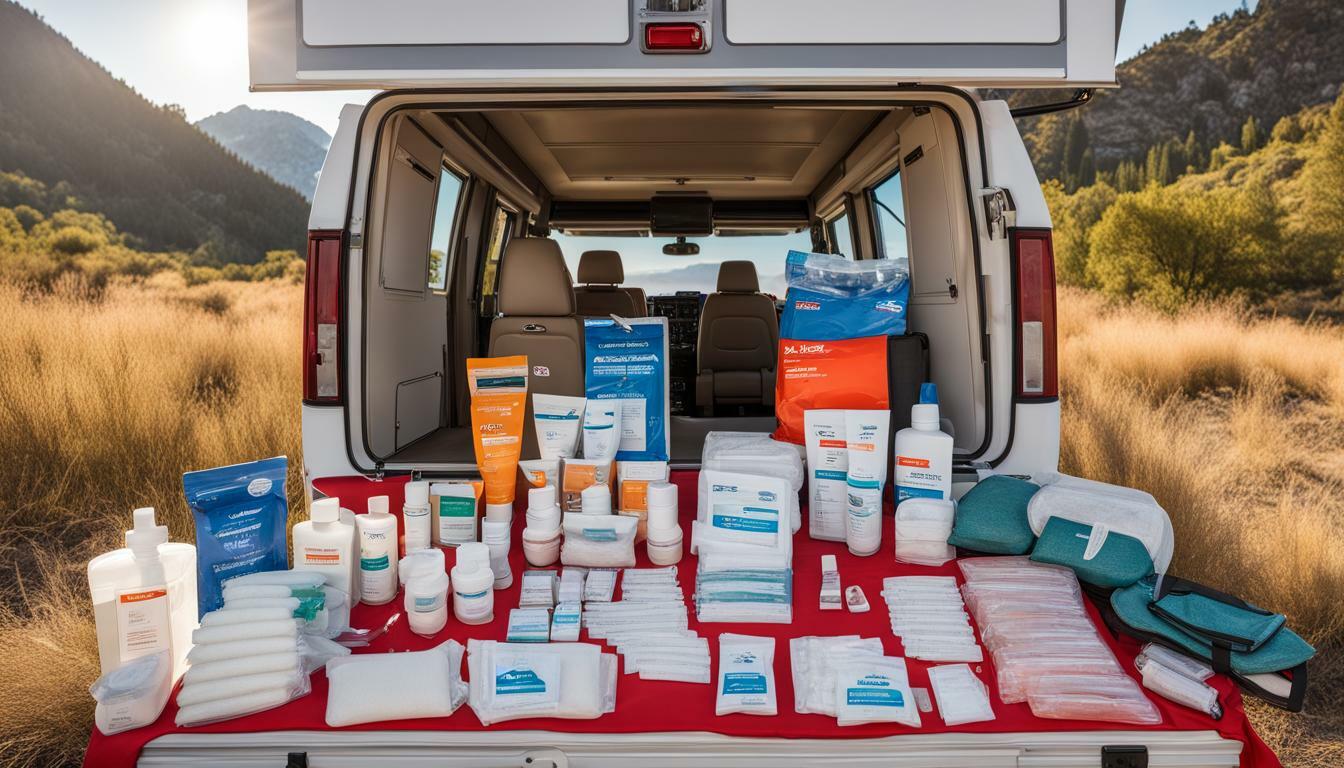
Ensuring Full-Time RVers’ Safety with Comprehensive Kits
Full-time RVing provides an unparalleled sense of freedom and adventure, but it also comes with its fair share of hazards. From extreme weather conditions to unexpected mechanical problems, full-time RVers must always be prepared for the worst. Comprehensive safety kits are crucial, as they help ensure full-time RVers’ safety and well-being on the road.
Full-time RVers safety kits should include items such as fire extinguishers, smoke detectors, and carbon monoxide detectors. These are essential safety devices that can detect and mitigate potential hazards in your RV. Moreover, they can help you avoid disasters caused by fire, smoke, or carbon monoxide poisoning.
Another must-have item is a tire pressure monitoring system. This device helps you monitor your RV’s tire pressure and temperature, preventing potential blowouts and other tire-related incidents. Investing in a quality system will provide you with peace of mind and ensure your safety while on the road.
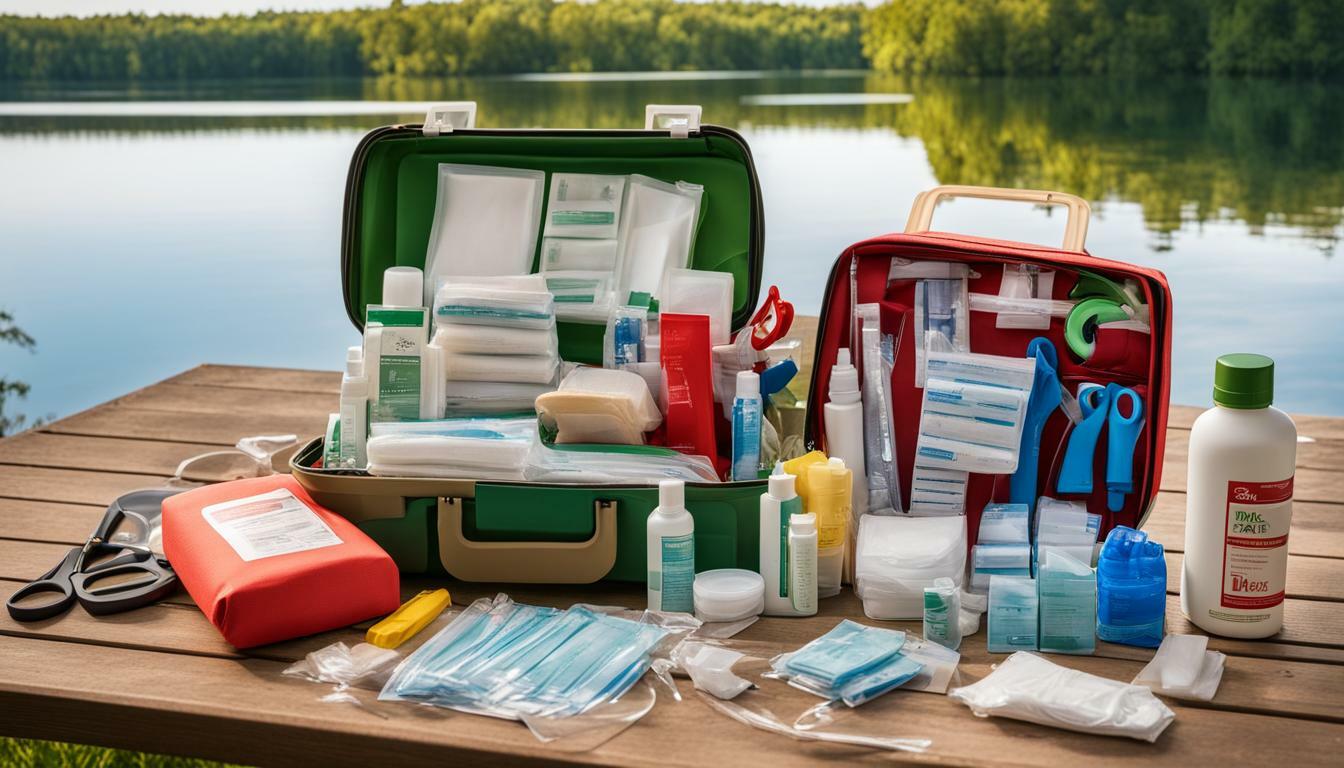
Other essential items that full-time RVers should have in their safety kits include emergency flares, reflective vests, and a reliable first aid kit. Emergency flares and reflective vests are necessary for signaling help in case of an emergency or breakdown.
A high-quality first aid kit can play a vital role in keeping you and your loved ones healthy and safe while on the road. With the right items, you can quickly deal with common injuries and illnesses, minimizing the damage caused by unforeseen incidents. A first aid kit should include items such as bandages, antiseptic wipes, gauze pads, and pain relievers.
Overall, comprehensive safety kits are essential for full-time RVers. They provide an extra layer of security while traveling and help minimize risks and accidents on the road. By investing in high-quality safety equipment, full-time RVers can ensure their safety and well-being while enjoying the freedom and adventure that comes with full-time RVing.
Key Essentials for Full-Time RVers’ Health Preparedness
When it comes to nomadic health preparedness, having a well-equipped first aid kit tailored to your specific needs is essential. As a full-time RVer, you need to consider the potential injuries or illnesses you may encounter on the road, and pack your kit accordingly. Here are some key items to consider including in your first aid kit:
| Item | Purpose |
|---|---|
| Antiseptic wipes | To clean and disinfect wounds |
| Adhesive bandages (multiple sizes) | To cover and protect minor cuts and scrapes |
| Gauze pads and roll | To dress larger wounds |
| Tweezers | To remove splinters or ticks |
| Thermometer | To monitor body temperature |
| Pain relievers | For minor aches and pains |
| Prescription medications | With instructions from your doctor |
| Sunscreen | To protect your skin from UV rays |
| Insect repellent | To ward off ticks, mosquitoes, and other pests |
Remember to periodically check the expiration dates of your first aid kit items and replace them as needed. Additionally, it’s important to keep your first aid kit in a dry and cool place, away from direct sunlight and heat.
By packing these key essentials in your first aid kit, you’ll be better prepared to handle any health issues that may arise while on the road. In the next section, we’ll discuss emergency preparedness for full-time RVers.
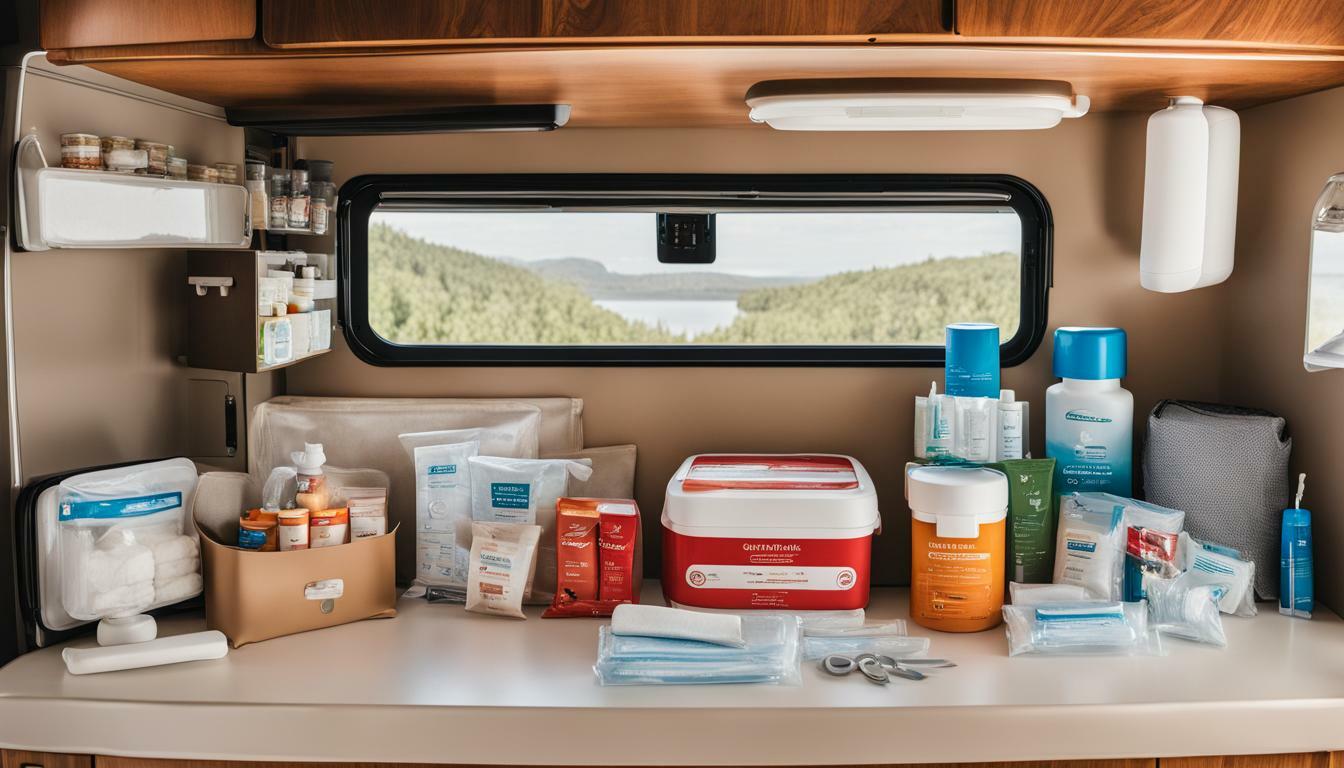
Emergency Preparedness for Full-Time RVers
Full-time RVers face unique challenges when it comes to emergency preparedness. Being constantly on the move means that they need to be ready for any situation that may arise on the road. From natural disasters to accidents, full-time RVers need to have a comprehensive emergency kit that covers all scenarios.
When creating an emergency kit for full-time RVers, it’s important to pack items that will help them survive for at least 72 hours. This includes non-perishable food, bottled water, and a first aid kit. In addition, they should have a supply of medications, an emergency radio, blankets, and a flashlight with extra batteries.
Full-time RVers should also consider investing in a portable generator or solar power system to ensure they have access to electricity in case of a power outage. They should also have a backup plan for communication, such as a satellite phone or a two-way radio.
It’s crucial to keep the emergency kit easily accessible, such as in the trunk of the RV or in a designated storage compartment. It’s also important to check the kit regularly and replace any expired items.
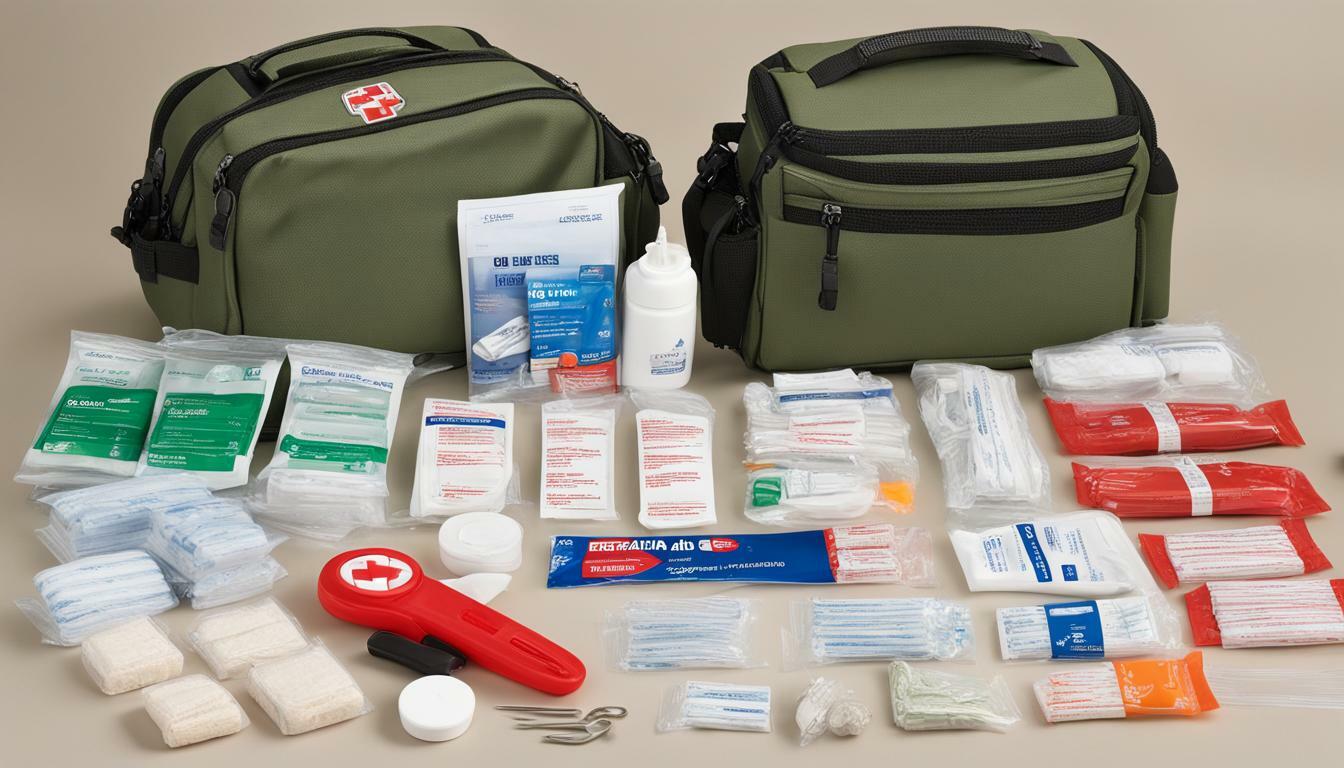
Being prepared for emergencies is essential for full-time RVers. By having a well-stocked emergency kit, they can rest assured that they are equipped to handle any situation that may arise on the road.
Stay Prepared and Protected: Additional Safety Measures
While having a well-equipped first aid kit is essential, there are additional safety measures full-time RVers should take to ensure their well-being on the road. These measures can complement their first aid and emergency kits and provide extra protection and peace of mind.
Full-Time RVers Safety Kits
One of the additional safety measures is to have a comprehensive safety kit. This safety kit should include items such as a fire extinguisher, a smoke and carbon monoxide detector, a tool kit, and emergency flares. Having these items in the safety kit can help full-time RVers deal with any unexpected situations such as a fire, gas leak, or breakdown in the middle of nowhere.
A reflective vest and safety cones are also recommended in case of a roadside emergency. Full-time RVers should be visible to other drivers to avoid any accidents. These items can be kept in a small container in the RV and easily accessible when the need arises.
RV Safety Preparedness
Driving an RV requires some preparation and safety precautions. Full-time RVers should ensure that their RV is in good condition before embarking on a trip. Regular maintenance checks should be done on the brakes, tires, and engine to avoid any accidents on the road.
Before driving, full-time RVers should also check the weather forecast and plan their route accordingly. Driving during extreme weather conditions such as heavy rain or snow can be hazardous, and it is best to avoid it if possible.
Another safety measure is to invest in good quality RV insurance. Accidents can happen, and having the right insurance coverage can help full-time RVers deal with any unexpected costs and damage to their RV.
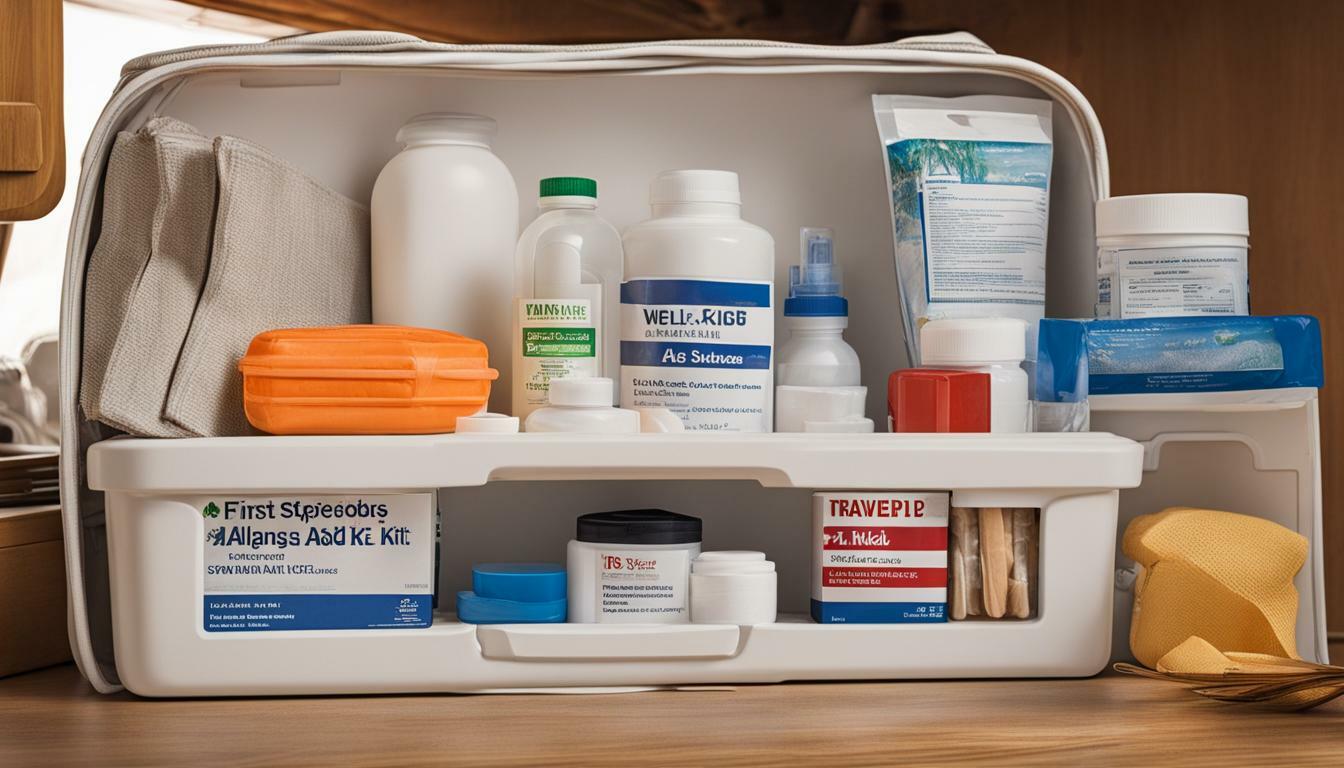
It is crucial for full-time RVers to take all safety measures seriously to protect themselves and their RV. In addition to having a well-equipped first aid kit and emergency kit, a comprehensive safety kit and RV safety preparedness can help ensure a safe and enjoyable journey on the road.
Dealing with Common RV-Related Injuries
When you’re on the road in your RV, it’s important to be prepared for any mishaps that may occur. This is why having a well-equipped first aid kit is essential for all full-time RVers. Here are some common injuries that you may encounter and how you can handle them using the contents of your first aid kit.
Burns
Whether it’s from cooking in your RV or sitting around the campfire, burns can happen easily. To treat a burn, start by running the affected area under cool water for at least 10 minutes. Then, apply a cooling gel or cream to soothe the skin. If the burn is severe or covers a large area of the body, seek medical attention immediately.
Cuts and Scrapes
Cuts and scrapes are a common occurrence for full-time RVers, especially if you enjoy outdoor activities like hiking or biking. To treat a cut or scrape, clean the wound with antiseptic and cover it with a sterile bandage or dressing. Change the dressing regularly to prevent infection.
Sprains and Strains
When you’re on the go, it’s important to take breaks and stretch your legs to prevent sprains and strains. However, accidents can still happen. To treat a sprain or strain, rest the affected area and apply a cold compress or ice pack to reduce swelling. You can also use a compression bandage for additional support.
By including these items in your first aid kit, you can be prepared for any common injuries that may occur during your travels. Remember to also seek medical attention if an injury is severe or if you’re unsure of how to treat it.
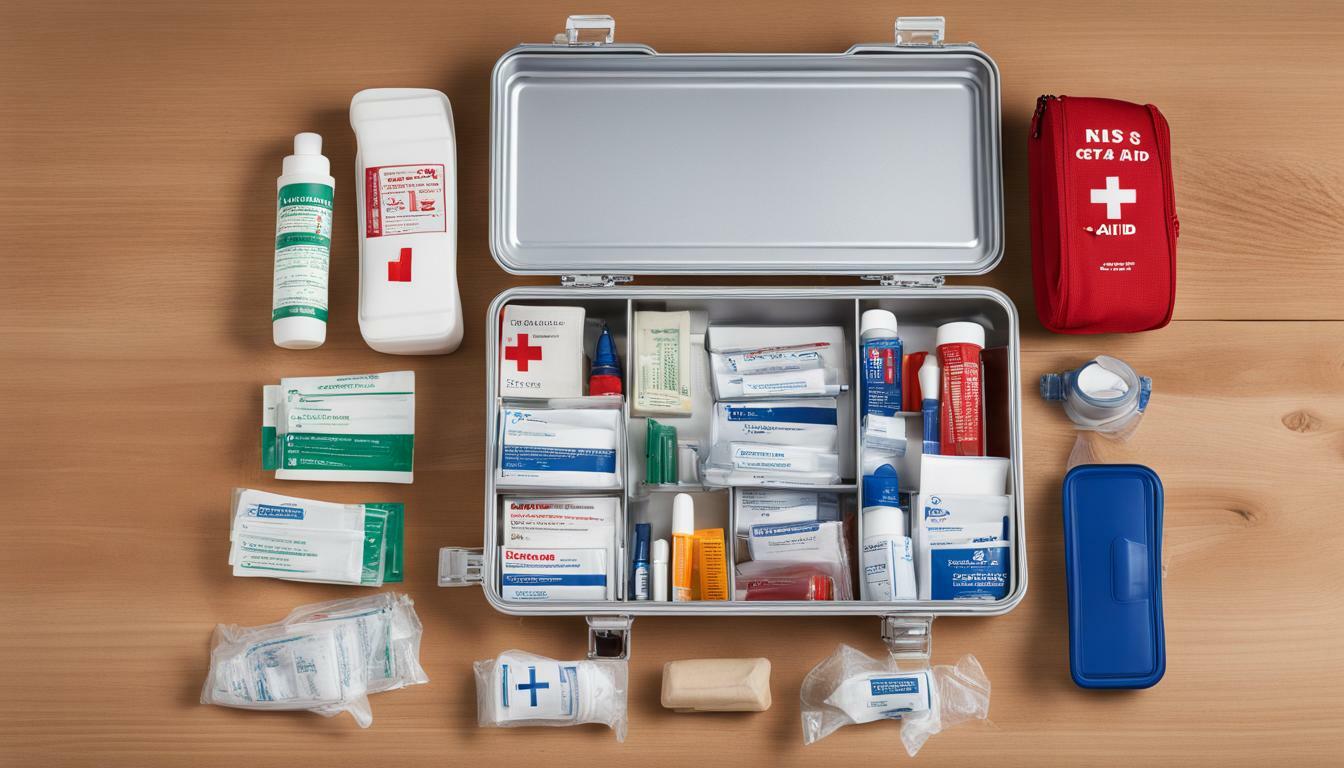
Staying Healthy on the Go: Tips for Full-Time RVers
While having a first aid kit and emergency kit on hand is crucial for full-time RVers, taking proactive steps to maintain good health is just as important. Here are some practical tips to stay healthy on the road:
- Stay Hydrated: Always carry a refillable water bottle with you and aim to drink at least 8 glasses of water a day. Dehydration can cause fatigue, headaches and dizziness, which can be dangerous while driving.
- Eat Well: Plan your meals in advance and stock up on healthy snacks like fruits, vegetables, and nuts. Avoid fast food and sugary snacks as much as possible. A balanced diet boosts your immune system and gives you the energy you need for outdoor activities.
- Maintain Good Hygiene: Hand washing is the best way to prevent the spread of germs and infections. Always wash your hands before eating and after using the bathroom and public facilities. Keep a hand sanitizer in your RV for times when soap and water are not available.
- Stay Active: Incorporate physical activity into your daily routine. Take a walk, hike, or bike ride, and stretch regularly. Physical activity not only improves physical health but also mental health.
- Get Enough Sleep: Adequate rest is essential for a healthy body and mind. Create a comfortable sleeping environment in your RV, and stick to a regular sleep schedule as much as possible. Avoid caffeine and alcohol before bedtime, as they can interfere with sleep quality.
- Practice Sun Safety: Wear sunscreen, hats, and sunglasses to protect your skin and eyes from harmful UV rays. This is especially important if you’re spending time outdoors hiking, swimming, or enjoying other activities.
By following these tips, you can maintain good health and enjoy your nomadic lifestyle to the fullest. However, in the event of an unexpected injury or emergency, having a first aid kit and emergency kit readily available can ensure prompt and effective treatment.
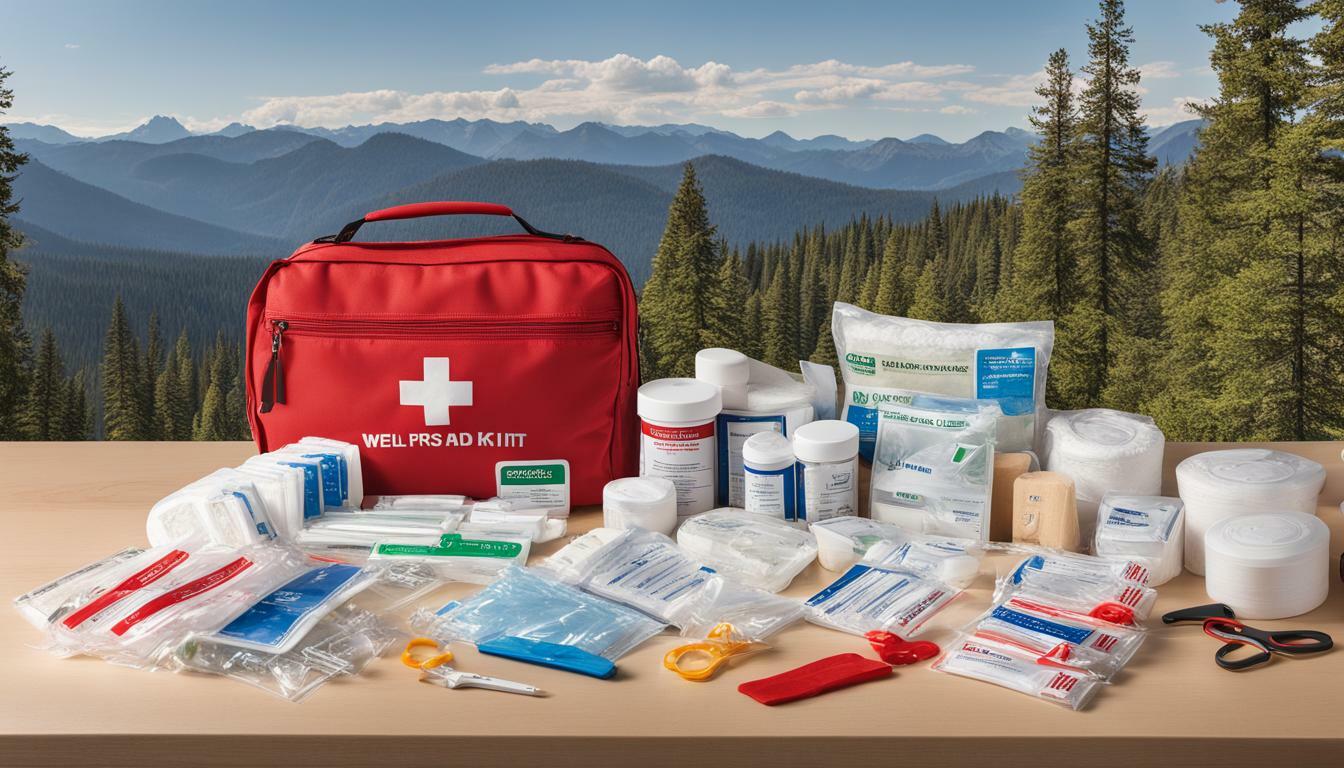
Conclusion
In conclusion, first aid kits and health preparedness are essential for full-time RVers to ensure their safety and well-being while on the road. By having a well-equipped first aid kit, full-time RVers can be prepared for any accidents or injuries that may occur. Additionally, it is crucial to prioritize health preparedness by including specific items in the first aid kit that address the unique needs of full-time RVers, such as motion sickness medication and insect repellent.
In case of emergencies, having an emergency kit with must-have items can be lifesaving. It is also important to take additional safety measures, such as installing smoke detectors and carbon monoxide detectors and practicing safe driving habits.
In dealing with common RV-related injuries, the contents of the first aid kit can provide immediate relief and prevent the injury from worsening or becoming infected. Taking practical steps such as stretching regularly, staying hydrated, and getting enough rest can also contribute to maintaining optimal health while on the go.
Overall, investing in first aid kits and health preparedness is an investment in your well-being as a full-time RVer. By staying prepared and taking necessary precautions, you can enjoy the freedom and adventure of the open road with peace of mind.
